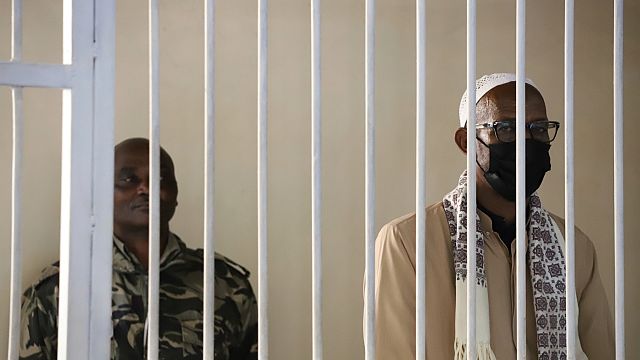**Introduction**
In the heart of Kenya’s bustling capital, Nairobi, justice unfurled its wings as the gavel echoed the verdict that reverberated through the nation. It was a moment of closure, yet a stark reminder of the lingering shadows of terror that have haunted the East African nation. The recent conviction of two Kenyan men for their roles in facilitating the heinous 2019 hotel terrorist attack has not only brought a semblance of justice to the victims but has also unveiled a deeper narrative of extremism, resilience, and the unyielding pursuit of peace in a region marred by violence and bloodshed.
**Background Context**
The trial that culminated in the conviction of Hussein Mohamed Abdille Ali and Mohamed Abdi Ali shed light on the intricate web of terror that has woven its threads across Kenya’s recent history. The 2019 attack on the DusitD2 hotel complex, a symbol of luxury and modernity in Nairobi, claimed the lives of 21 individuals and left 28 others wounded. The perpetrators, fueled by extremist ideologies, orchestrated a brazen assault that sent shockwaves not only through Kenya but reverberated across the globe.
Judge Diana Kavedza’s ruling marked a pivotal moment in the quest for justice, underscoring the resilience of Kenya’s judicial system in the face of terror. The prosecution’s meticulous presentation of evidence, bolstered by 45 witnesses, meticulously unraveled the culpability of the two men in orchestrating the attack. Their nefarious roles in sending funds and procuring fake identification documents for the militants who carried out the assault were laid bare, painting a chilling picture of the extent to which extremism had infiltrated the fabric of Kenyan society.
**Main Story Details**
The specter of terror that loomed over Kenya was further exacerbated by the backdrop of previous attacks that had scarred the nation’s collective memory. The Westgate Shopping Mall massacre in 2013, which claimed the lives of 67 individuals, and the tragedy at Garissa University in 2015, where 147 students lost their lives, served as grim reminders of the ever-present threat posed by extremist groups like the al-Qaida-linked al-Shabab.
The roots of the DusitD2 attack, like the tendrils of a poisonous vine, extended beyond Kenya’s borders, reaching into the neighboring Somalia where al-Shabab found sanctuary and nurtured its malevolent agenda. The group’s animosity towards Kenya, stemming from the latter’s military intervention in Somalia since 2011, manifested in a series of retaliatory attacks that bled across the porous boundaries of the two nations.
The decisive blow struck by Kenyan authorities during the Dusit attack resulted in the demise of all five attackers, yet the scars left on the survivors and the families of the victims ran deep. Among the casualties were foreign nationals, including an American and a Briton, underscoring the global ramifications of terrorism and the interconnectedness of nations in the face of such threats.
**Expert Analysis**
**Dr. Sarah Mwangi, Counterterrorism Expert:** “The conviction of the facilitators in the 2019 Kenyan hotel attack is a significant milestone in the fight against terrorism in the region. It not only underscores the importance of robust counterterrorism measures but also highlights the imperative of addressing the root causes of extremism, including socio-economic disparities, radicalization, and porous borders that enable the free flow of terrorists and resources.”
**Broader Implications**
The ramifications of the conviction reverberated far beyond the confines of the courtroom, sending a resounding message to all those who sought to sow seeds of terror in the region. It served as a beacon of hope for the victims and their families, a testament to the unwavering resolve of the Kenyan people in the face of adversity. The ripple effects of this landmark verdict resonated across borders, prompting a reevaluation of counterterrorism strategies and fostering greater collaboration among nations in combating the scourge of extremism.
**Future Outlook**
As Kenya navigates the complex terrain of security challenges and grapples with the ever-evolving threat landscape, the conviction of the two facilitators stands as a poignant reminder of the need for vigilance, resilience, and unity in the face of terror. The road ahead may be fraught with uncertainties, but the resolve of the Kenyan people, bolstered by a steadfast commitment to justice and peace, remains unwavering. It is in the crucible of adversity that nations forge their resolve, and Kenya’s journey towards healing and resilience serves as a beacon of hope for a world besieged by the shadows of terror.
**Conclusion**
The conviction of Hussein Mohamed Abdille Ali and Mohamed Abdi Ali for their roles in facilitating the 2019 hotel terrorist attack symbolizes a watershed moment in Kenya’s ongoing battle against extremism. It is a testament to the unwavering commitment of the nation to seek justice, uphold the rule of law, and defy the darkness that threatens to engulf its spirit. As the echoes of the verdict fade into the annals of history, they leave behind a resounding message of resilience, unity, and the indomitable human spirit that refuses to be cowed by the forces of terror. Kenya, scarred yet unbowed, stands as a beacon of hope in a world fraught with uncertainty, a testament to the enduring power of justice and the triumph of the human spirit over adversity.
References:
– Africa News. (http://www.africanews.com/2025/05/23/kenyan-court-finds-two-men-guilty-of-facilitating-2019-hotel-terrorist-attack/)
Originally reported by Africa News
Read more at: http://www.africanews.com/2025/05/23/kenyan-court-finds-two-men-guilty-of-facilitating-2019-hotel-terrorist-attack/









Leave feedback about this